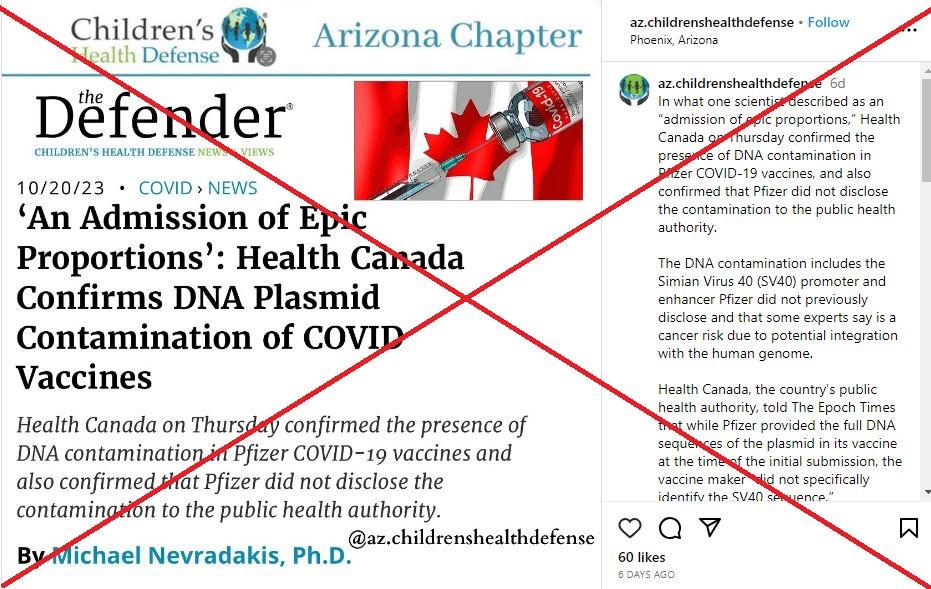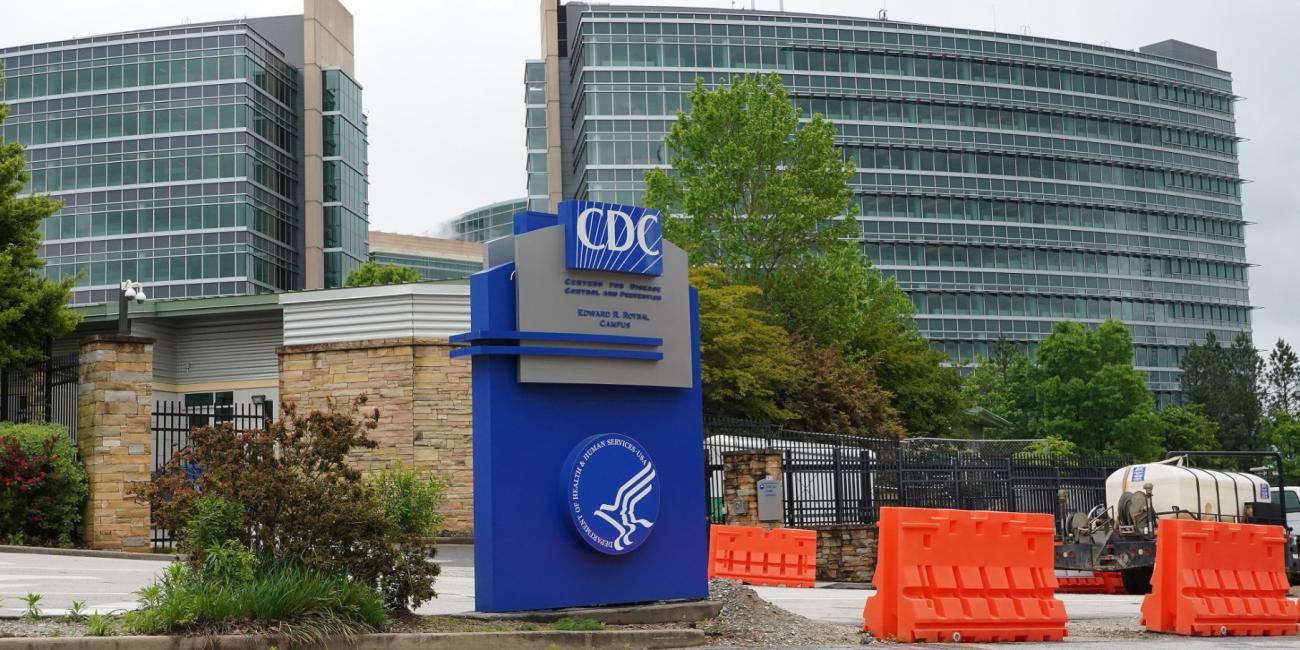
Posts misrepresent Health Canada statement on DNA in Covid vaccines
- This article is more than two years old.
- Published on November 1, 2023 at 20:10
- 4 min read
- By Rob Lever, AFP Canada, AFP USA
"In what one scientist described as an 'admission of epic proportions,' Health Canada on Thursday confirmed the presence of DNA contamination in Pfizer COVID-19 vaccines," says Children's Health Defense, an anti-vaccine advocacy group that has repeatedly published health misinformation, in an October 20, 2023 article and related Instagram post.
The organization points to an October 19 article from the Epoch Times, a website that has previously spread misinformation about vaccination and the pandemic.
"Health Canada has confirmed the presence of a Simian Virus 40 (SV40) DNA sequence in the Pfizer COVID-19 vaccine, which the manufacturer had not previously disclosed," the story says.
The Epoch Times quotes Health Canada saying it had confirmed "the presence of the enhancer based on the plasmid DNA sequence submitted by Pfizer."
The report followed an October 19 preprint study that claims the shot has "billions to hundreds of billions of DNA molecules per dose" -- findings the authors say "extend existing concerns about vaccine safety."

Similar claims ricocheted across platforms such as TikTok, Instagram, Facebook and X, formerly known as Twitter.
The posts build on the debunked narrative that Covid-19 vaccines contain harmful DNA particles that could alter recipients' genetics. The Children's Health Defense article suggests the latest study indicates the jabs pose a "cancer risk due to potential integration with the human genome."
That is inaccurate, according to public health authorities and independent experts.
Messenger ribonucleic acid (mRNA) Covid-19 vaccines are developed using plasmid -- a small, circular piece of DNA, according to a fact sheet (archived here) from the US National Human Genome Research Institute (NHGRI). One such piece of DNA comes from SV40, a pathogen in monkeys used to prepare polio vaccines in the 1950s (archived here and here).
While the virus itself is associated with cancer, there is no conclusive evidence that tumors in humans were caused by the polio shots -- and the pathogen itself has not been present in any vaccines since 1963, according to Children's Hospital of Philadelphia (archived here).
"The Pfizer-BioNTech COVID-19 vaccine does not contain simian virus 40 (SV40)," Health Canada told AFP in an October 27 statement. "The presence of the SV40 promoter enhancer sequence is not the same as the presence of the whole virus itself."
Barry Pakes, a public health physician at the University of Toronto, added in an October 31 email that there is "no truth whatsoever that an SV40 genome sequence can have an impact on human DNA, even theoretically."
Health Canada clarifies
The fragment of SV40 DNA in Pfizer's Covid-19 vaccine helps the "transcription" of mRNA during the production process. Manufacturers use such plasmids because "they are easy to replicate (copy) and reliably contain the target gene sequence," according to NHGRI.
Michael Imperiale, a virologist at the University of Michigan, put it this way: "To make mRNA, you need DNA."
Health Canada has pushed back on claims that the fragment is potentially harmful.
"The SV40 promoter enhancer sequence was found to be a residual DNA fragment in Pfizer-BioNTech COVID-19 vaccine," the agency told AFP. "The fragment is inactive, has no functional role, and was measured to be consistently below the limit required by Health Canada and other international regulators."
Imperiale confirmed that to AFP on November 1, saying it is "not unexpected that there would be a little bit of DNA" in the shot due to the manufacturing process and that such remnants are "inert" and harmless.
Some of the posts circulating online falsely conflate the DNA element with SV40 itself to claim Covid-19 shots cause cancer.
"Any claims that the presence of the SV40 promoter enhancer sequence is linked to an increased risk of cancer are unfounded," Health Canada said. "There is also no evidence to support that the presence of the full SV40 in any vaccine increases the risk of cancer or the acceleration of cancer in individuals."
Pfizer spokesperson Kit Longley confirmed to AFP in an email October 30 that "specific, non-infectious parts of the SV40 sequence -- which are commonly used in the pharmaceutical industry -- are present in starting material used by Pfizer and BioNTech."
He added that "small amounts of residual DNA can be found in several approved vaccines," such as influenza and hepatitis shots (archived here and here).
Flawed research
The claims stem from what experts say is a flawed paper following up on a similar report from earlier in 2023 -- neither of which is peer-reviewed.
"The preprint paper cited here has numerous methodological and interpretation issues," said Pakes of the University of Toronto. "I would certainly wait until it was published in a peer-reviewed journal before giving it any credence."
In an October 21 blog post (archived here), Wayne State University professor David Gorski outlined some of the flaws in the paper, which analyzed the presence of DNA in 27 mRNA vials from Pfizer and Moderna in Ontario, Canada.
"By the authors' own measurements, the amount of DNA/vial fell below the (US Food and Drug Administration) guidance," he said. "They used a log scale to make the total DNA appear to be much closer to the FDA-recommended limit than it really is."
For example, Gorski noted the researchers found the vial with the "very highest concentration of DNA" had "less than one-half the maximum DNA amount recommended by the FDA."
AFP has previously debunked the claim that Covid-19 vaccines cause cancer, which the Memorial Sloan Kettering Cancer Center in New York City says is a "myth" (archived here).
Read more of AFP's coverage of vaccine misinformation here.
Copyright © AFP 2017-2026. Any commercial use of this content requires a subscription. Click here to find out more.
Is there content that you would like AFP to fact-check? Get in touch.
Contact us




